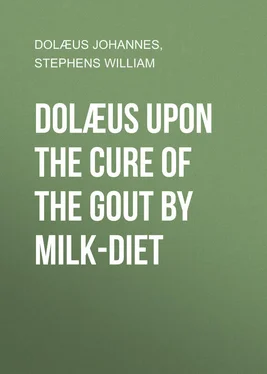Johannes Dolæus - Dolæus upon the cure of the gout by milk-diet
Здесь есть возможность читать онлайн «Johannes Dolæus - Dolæus upon the cure of the gout by milk-diet» — ознакомительный отрывок электронной книги совершенно бесплатно, а после прочтения отрывка купить полную версию. В некоторых случаях можно слушать аудио, скачать через торрент в формате fb2 и присутствует краткое содержание. Жанр: foreign_antique, foreign_prose, на английском языке. Описание произведения, (предисловие) а так же отзывы посетителей доступны на портале библиотеки ЛибКат.
- Название:Dolæus upon the cure of the gout by milk-diet
- Автор:
- Жанр:
- Год:неизвестен
- ISBN:нет данных
- Рейтинг книги:4 / 5. Голосов: 1
-
Избранное:Добавить в избранное
- Отзывы:
-
Ваша оценка:
- 80
- 1
- 2
- 3
- 4
- 5
Dolæus upon the cure of the gout by milk-diet: краткое содержание, описание и аннотация
Предлагаем к чтению аннотацию, описание, краткое содержание или предисловие (зависит от того, что написал сам автор книги «Dolæus upon the cure of the gout by milk-diet»). Если вы не нашли необходимую информацию о книге — напишите в комментариях, мы постараемся отыскать её.
Dolæus upon the cure of the gout by milk-diet — читать онлайн ознакомительный отрывок
Ниже представлен текст книги, разбитый по страницам. Система сохранения места последней прочитанной страницы, позволяет с удобством читать онлайн бесплатно книгу «Dolæus upon the cure of the gout by milk-diet», без необходимости каждый раз заново искать на чём Вы остановились. Поставьте закладку, и сможете в любой момент перейти на страницу, на которой закончили чтение.
Интервал:
Закладка:
The Chyle of Plants seems to be made up of whatever Parts in the Earth are soluble in Water, so as to be capable of being received into the Absorbent or Recipient Vessels of Plants, before taken Notice of; and consequently may consist of Salts, Oyls, Fumes of Minerals, Metals, and other fossil Bodies, the putrified Parts of Animals and Vegetables. In its first State it is, to be sure, very crude; but by the Structure and Fabrick of the Plant, and the various Vessels it is strained thro’, it is changed, elaborated, secreted, and assimilated into the Substance of the Plant; whence it follows, that in Vegetables are contained Salts, Oyl, Water, and Earth, and probably Metals too, for the Ashes of Vegetables yield somewhat which the Load-Stone attracts.
This Juice, when it first enters the Root, is Earthy, Watry, Poor, and Acid, it is in the Form of a fine and subtle Water; the nearer it is to the Root, the more it retains of its proper Nature, the further it is from the Root, and the more Action it hath sustained it approaches nearer to a Vegetable Nature, as will appear by pursuing it a little further. In the Trunk and Branches it is further prepared, tho’ even here it is Watry and Acid, as appears by tapping Trees at the proper Season: It is more concocted in the Bud, where the Leaves coming to be unfolded, serve as Lungs for the further Preparation of it in the Course of Circulation; in the Flower, Leaves and Parts of Generation, it is still further elaborated, and becomes in its utmost Perfection, fine enough to preserve and nourish the Embryo in the Seeds of Plants. This Nutritious Juice or Chyle is pretty universal, and is found in every Part of a Plant, but more or less in Quantity, and more or less impregnated with the more Elaborate Juices, according to the Number and Degree of its Circulations. It seems to be the universal Diluent and Conveyer of other and more elaborated Particles. Besides what I have mentioned, there are Juices particular to particular Parts of Plants; as Oyl, Wax, and Manna to the Leaves; Volatile Oyl or Spirit, and Honey to the Flower; a very fine Essential Oyl or Balm to the Seed, and that in great Quantity; Oyl, Balm, Pitch, Resin and Gum to the Bark: Besides which, there is a Juice peculiar to each Plant, and received in Vessels of its own, in which a good Deal of its Specifick Nature may consist, (for it is not reducible to any of those before mentioned) most of the English Authors call this the proper Juice of the Plant, but Boerhave and later Writers call it the Blood. I should digress too much to enter into the natural History of these several Parts of Vegetables; my Design at present reaching no further than with Respect to their Assimilation into Animal Substance; and therefore I refer to the Authors who have expresly treated of these Matters, and proceed to examine Vegetable Juices in another Light.
The Juices of Plants are Watry, Saline, Oily, Spirituous, Gummy, Balsamick, or Resinous, all discoverable by Art. The Water is generally found in the Absorbent Vessels of Plants, but mixed with a Proportion of Salt, which, tho’ always soluble in Water, otherwise appears of very different Nature in different Plants, and differs in Degree of Volatility.
The Oily Part is that which grows Fluid at the Fire, proves inflammable, and will not unite with Water, without the Intervention of Salt. It is seldom obtained pure from Vegetables, because therein it exerts so very strong an attractive Force upon Salt, Water, and Earth, that nothing less than the Force of Fire, assisted by the Action of the Air, can separate them, as appears in Helmont’s Everlasting Coal.
The Spirituous Parts of Plants, or those which contain the Odour and Taste, are very volatile, will mix with Water, and sometimes burn in the Fire, the Oyl of the Vegetable being here greatly attenuated, broke, and subtilized; as appears by its being exhalable by the Heat of the Summer Sun, so as to form the particular Atmosphere of the Plant, and fill the Air with Particles that affect our Senses even at some Distance.
Gums are such Productions of Vegetables, as will mix with Water, dissolve over the Fire, and burn away, being tough viscid Substances, and contain a large Proportion of the Oyl and Salt of the Plant. Balsams are native Oyl of Vegetables, brought to a thick Consistence, but containing a large Proportion of an acid Spirit and Salt: However, they differ greatly from the Oyls they afford. Lastly, Resins are such Productions of Vegetables, as being hard and dry, prove brittle in the Cold, soluble by Heat, inflammable and misceable with Oyl, but not with Water.
It would be endless to give an Account of the particular Qualities of the proper Juices of Plants; since these differ in different Plants, and many Times in different Parts of the same Plant. There is a much greater Variety in Vegetable than in Animal Nature; and a much greater Difference in the Juices of one than of the other; for the Number of different Plants known and used very much exceeds the Number of different Animals known and used; and particular Plants have greater Variety of Juices than particular Animals; whose Juices (if I may so speak) are more homogenial than those of Plants. This will appear more evidently by comparing what hath been here said, with the Consideration of Animal Substances with Regard to Diet.
I have hitherto considered Vegetables in their natural State, but before we can apply what hath been laid down to Animal Diet, we must consider some Changes many of them undergo, before they are used. The Chief of these happens by Fermentation, the Effects of which upon Vegetables deserve to be considered; since Bread, Wine, and Malt Liquors, so great a Part of our common Food, are prepared from Vegetables that have gone thro’ this Operation, or are mixed with Ferments in their Preparation.
Fermentation is a Change in Vegetables by Means of some intestine Motion, the Effect whereof is, that in Distillation there arises a volatile inflammable Liquor, capable of mixing with Water, commonly called Spirits; or if the Fermentation be so managed as to produce Vinegar, thence arises in Distillation a watry, thin, acid Liquor, capable of extinguishing Fire. I have here only mentioned the Effects of Fermentation; what this intestine Motion is, or its Cause, I do not pretend to describe, because I do not know it: Its Effects are very well known to be either a vinous or an acetous Liquor, and they are producible from all Vegetables, and from Vegetables only; for all the Art yet known will never gain such Spirits either from Fossils or Animals: Putrefaction, Digestion, and Effervescence are all done by intestine Motions, but will neither produce Wine nor Vinegar; so that in this Light Fermentation is confined to Vegetables.
It needs no very deep Enquiry into the History of Fermentation, to know, that in Wine (by which Name I understand all fermented Vegetable Liquor, Ale, Beer, Mead, and all artificial Wines, as well as that made from the Grape) the Spirituous Parts of the Vegetable are so volatilized and loosened, that very small Heat raises them from the other Parts of the Liquor, even many fly off upon being exposed to the Air: The viscid, oily, and glutinous Parts of Vegetables are so broke and separated, and the Spheres of their mutual Attractions so diversified, that they are no longer retained. Before Fermentation, the longer you boil the Decoction of any Vegetable, its oily and spirituous Parts are more concentrated, and little besides Water, and some essential Oyl goes away; after Fermentation the Spirit goes away, and the Water remains: This is commonly known to Brewers and Distillers.
What is next observable in this Change is, that the essential Salt is thrown from the Body of the Liquor thus fermented, and adheres to the Side of the Vessel wherein the Liquor is deposited, and crystallizes into Tartar. In Vinegar this Salt is kept in the Mass of the Fluid (the Oyl being thrown off) where uniting with the aqueous and spirituous Parts, it turns sowre, and becomes Vinegar by Means of that Fermentation. After this no Tartar can be generated from it, nor any inflammable Spirit obtained; but on the contrary, a watry, poor, acid Liquor, capable of extinguishing Fire, rises first from the Still. In Wine, the volatile Salt and Oyl of the Vegetable are attenuated and reduced into one Spirit; Vinegar is the essential Salt of Wine made more acid by a new Fermentation, and intimately mixed with the watry and spirituous Parts of the same.
Читать дальшеИнтервал:
Закладка:
Похожие книги на «Dolæus upon the cure of the gout by milk-diet»
Представляем Вашему вниманию похожие книги на «Dolæus upon the cure of the gout by milk-diet» списком для выбора. Мы отобрали схожую по названию и смыслу литературу в надежде предоставить читателям больше вариантов отыскать новые, интересные, ещё непрочитанные произведения.
Обсуждение, отзывы о книге «Dolæus upon the cure of the gout by milk-diet» и просто собственные мнения читателей. Оставьте ваши комментарии, напишите, что Вы думаете о произведении, его смысле или главных героях. Укажите что конкретно понравилось, а что нет, и почему Вы так считаете.












